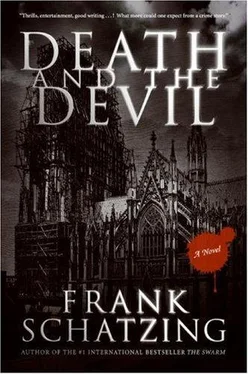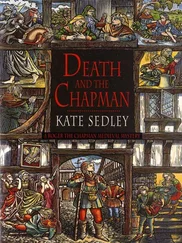Had he said something?
Voices and steps could be heard from the other side of the cathedral, probably people who had heard the scream. Jacob hesitated, then placed his ear close to Gerhard’s lips and closed his eyes.
It was three words.
Without thinking, Jacob grasped his hand and squeezed it.
A trickle of blood came out of Gerhard’s mouth.
He was dead.
For Christ’s sake, get out of here, the voice urged.
Jacob could hear strange scraping noises above him. He leaped up. Something was coming down the scaffolding. He bent his head back and looked up.
He caught his breath.
The tall black shadow was coming closer, story by story. But it was not climbing down, it was jumping with uncanny speed, springing across the planks as nimbly as an animal, its hair streaming out behind like a comet’s tail.
It had almost reached him.
Whoever or whatever it was that was coming, Jacob felt no desire to make its closer acquaintance. He turned on his heel and ran as fast as he could. People were approaching across the cathedral close, shouting and gesticulating. Jacob darted sideways, slipped into the shadow of a workman’s shed, and managed to join the crowd from behind. Everybody was talking at once. Someone shouted out the news and already others were carrying it out of the cathedral and into the streets.
No one had seen him. Apart from the shadow.
Oddly enough, it was the apples that came to mind at that moment. He patted his pockets. Some were still there, they’d not all come out when he’d fallen down. Good. He’d saved more than just his skin.
As unobtrusively as possible, he strolled across the close and out by Dragon Gate. He turned around once, but there was no sign of the shadowy being on the scaffold.
Somewhat relieved, he quickened his pace and set off along Bechergasse.
Urquhart followed him at a distance. He had pulled his cloak up to cover his hair and, despite his height, was merely a phantom among the busy crush of people, as black and inconspicuous as the night that was falling.
It would have been easy to kill the fellow on the building site. Urquhart knew he had observed the murder. But Gerhard’s death was supposed to look like an accident. The shattered body of the architect, and beside it another with a crossbow-bolt in his chest—that wasn’t the idea. Nevertheless, he had to dispose of the annoying witness who had so unexpectedly tumbled out of the tree quickly and well away from the cathedral, someplace where there were not many people around. The crossbow under his cloak was ready, but in the crowded market area there was no opportunity for a shot. The head of the fellow kept disappearing among people going home or to vespers, as he hurried on his way out of the city.
What had Gerhard whispered to him? Had he said anything at all or had the only thing to pass his lips before he died been blood? But if he had spoken, then that fellow was carrying a secret, and it was hardly to be expected he would keep it to himself.
He could spoil everything.
Urquhart lengthened his stride while his mind was working out what he knew about his quarry. Observations combined like glass tiles in a colorful mosaic. The man had red hair. When he fell out of the tree his hat had been pulled off. Urquhart had seen his red mane blaze up in the evening sun before he ran over to Gerhard. And he seemed to be in good physical condition. A fast runner. He had to be. Anyone clambering around in the archbishop’s orchard at that time of night must be a thief and thieves could either run like the wind or were dangling from the gallows. A clever thief, too. The way he had blended with the crowd suggested an alert mind, as did the fact that he had immediately made for the busiest streets, where it was difficult for someone to follow him.
Though not for Urquhart the Shadow.
There were still too many people in the streets. For the moment all he could do was keep the redhead under observation. With any luck he would have some stolen goods in his coat and would make for his hiding place, perhaps the place where he slept. They were usually quiet places. Thieves kept away from other people.
Unless he had a bed in a monastery. It wasn’t easy to get into the friaries and hospices. To follow him there might pose a problem.
There was no time to lose.
Urquhart slipped his hand under his cloak and grasped his crossbow. They were in Minoritenstraße; the Franciscan monastery was there on the right.
And, suddenly, almost all the people seemed to disappear into some house or other. The odd figures still out were hurrying over the slippery ground, heads down against the rain. Then, for a brief second, the street was empty except for the witness hurrying along in his floppy hat. The witness who had seen too much and heard too much.
Urquhart raised his arm.
And quickly lowered it. Too late.
Four men, all of them pretty down-at-heel, had come out of a low tavern opposite the monastery. One greeted the redhead noisily. The others gathered around the two and all Urquhart could see was shoulders and backs.
He crept along in the shadow of the wall of Greyfriars church until he was close enough to hear. Then he waited.
“Tilman!” cried Jacob. It was his friend from the Duck Ponds staggering out of the tavern. Jacob was delighted. He had headed for the Hen in the hope of finding Tilman there before the source dried up.
And he needed someone to talk to. He hadn’t got over the fright yet.
Tilman grinned. He didn’t look any better than he had two hours ago, but there was a feverish gleam in his eyes. The drink was having its effect.
The others were beggars, too. Jacob only knew them by sight. Apart from one, who shared the “privilege of the Wall” with him, an unpleasant tub of lard, with whom he’d exchanged insults now and then. Nothing to get worked up about. They understood each other, that was all. Or, to put it another way, so far neither had smashed the other’s skull in for a few scraps of food. Not that there weren’t enough smashed skulls around. The fat man had a propensity to violence when there was something to be gotten out of it. The word was, he was getting careless. Jacob gave him six months before his head dropped in the executioner’s basket.
The Hen was one of the few ale houses that didn’t throw people out just because they were dressed in rags. The landlord was tolerant of the poor, as long as they could pay. Many beggars lived honest, God fearing—and correspondingly short—lives, and there was no reason why they should not enjoy the blessings of the Cologne brewer’s art.
With time, however, the clientele had sunk so low that respectable people no longer went there. The landlord had to put up with local hostility, especially from the Greyfriars, whose monastery was directly opposite. As well as that, the town whores complained it operated as an unofficial brothel for part-time prostitutes, ostensibly respectable ladies who sold themselves, secretly of course, to wealthy gentlemen. Thus they took business away from the licensed whores, which annoyed the town executioner, under whose jurisdiction they were placed and to whom they paid dues.
There had been repeated threats against the Hen, and the landlord had grown cautious. Only recently a brewer in Cleves had been accused of sorcery and burned at the stake. The night that happened, the venerable Franciscan brethren had written the word “Cleves” in pitch on the door; the merchant families in the imposing neighboring houses, at the sign of the Large and the Small Water-Butt, wondered out loud about a denunciation to the Holy Inquisition because their children had seen black cats running out of the Hen while inside two demons, Abigor and Asmodeus, in the form of lecherous women had shouted obscenities and given off sulfurous odors. Jacob wondered how the children knew it was precisely those two demons when there must be at least—how many was it?—at least ten demons, but the Hen had its problems.
Читать дальше












